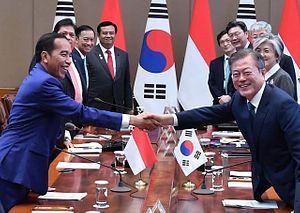Last month, new reports surfaced regarding the ongoing status of discussions between Indonesia and South Korea about a joint fighter jet program. The reports have once again fueled speculation about ongoing renegotiations between the two sides as to the terms of the deal, following previous indications that Jakarta may actually withdraw from the earlier arrangement reached with Seoul.
As I have noted before in these pages, Indonesia and South Korea have a defense relationship as part of their wider ties, which were elevated to a special strategic partnership in 2017. Indonesia is already among the biggest importers of South Korean defense equipment in the region, and collaboration has progressed to varying degrees on several fronts including submarines. One key initiative in this regard has been the development of the new KF-X/IFX fighter aircraft, even though the exact status of the program has been through repeated cycles of uncertainty, in part due to budgetary constraints cited by Jakarta.
This state of uncertainty had continued on into 2019, and late last month, we saw another round of reports surface regarding the status of the program. The reports came after Indonesia’s Coordinating Minister for Political, Legal, and Security Affairs Wiranto, who has been involved in discussions surrounding the deal, once again noted on July 18 that the deal between Indonesia and South Korea would need to be renegotiated, even though Indonesia remained committed to it in principle.
Per local Indonesian news outlets, although Wiranto said Indonesia did not want to withdraw from the project in recognition of the longstanding friendship it had had with South Korea as well as the value Jakarta would derive from aspects such as technology transfer, the government’s lack of budget meant that renegotiation would need to be pursued. Though he did not get into much detail, he mentioned that there was a need to reduce Indonesia’s share as part of the deal.
Wiranto did not go into specifics about what the state of the renegotiation is. But, separately, The Korea Herald noted that South Korea’s Defense Acquisition Program Administration (DAPA) had said that as of July 22, Indonesia is running about 300 billion won (about $252.05 million) in arrears with respect to the program. DAPA also noted that no additional payments had been received by Indonesia since a payment of 132 billion won earlier this year, and that, all in all, Jakarta had thus far paid about 220 billion won of its share of 1.7 trillion won thus far.
Understandably, both governments have been reluctant to elaborate publicly on the private talks they are having about the agreement. Nonetheless, as Indonesia’s new government takes shape for the second term of Indonesian President Joko “Jokowi” Widodo, the status of ongoing defense arrangements with Jakarta’s key partners such as this one will be important to watch.































